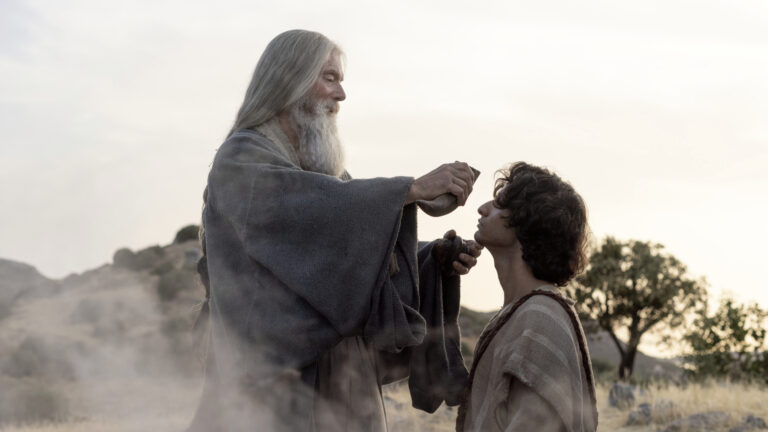You are undoubtedly familiar with the so-called messianic complex—the skewed attitude of a person who seems to have (or tries to be!) the solution to everyone else’s problems—but have you considered the dangers of a prophetic one?
There’s a warning embedded in the final, perplexing chapter of Elijah’s ministry (1 Kings 19). One moment Elijah is at the pinnacle of his prophetic influence, summoning the God of Israel to destroy the manic prophets of Baal (1 Kings 18:39–40). In the next, he’s passing the mantle (literal and prophetic) of ministry to an ox driver plowing in a field (1 Kings 19:19).
Sandwiched in between is the account of Elijah persecuted by Israel’s rulers, fleeing into the wilderness to preserve his life (1 Kings 19:1–18). Despite his showdown with the Baal prophets and his prayer-effected end to the seven-year drought, Elijah is convinced that Israel will not return to YHWH. King Ahab’s cowardice and Jezebel’s threatenings seem enough evidence for Elijah to abandon hope.
But he doesn’t flee aimlessly. Instead, Elijah runs directly to Horeb (Sinai), the mountain where YHWH revealed himself to Moses in the defining moment of Israel’s history—his mercy and kindness especially poignant after the shocking idolatry of the golden calf (Ex. 32). There YHWH revealed his name as “The LORD, the LORD, a God merciful and gracious, abounding in steadfast love and faithfulness” (Ex. 34:6).
Elijah believes that Ahab and Jezebel prove Israel’s stiff-necked obstinance. The future is so bleak, Elijah seems to think, that God might conclude his people are as stiff-necked as in the episode of the golden calf. Elijah is returning to Horeb to plead like Moses did in Exodus 32.
But things go differently with Elijah. YHWH asks a surprising question: “What are you doing here, Elijah?” Rather than interceding for God’s mercy on his covenant people, as Moses did in Exodus 33, Elijah recounts Israel’s unfaithfulness. Startlingly, Elijah concludes, “I, even I only, am left.” Perhaps Elijah thinks YHWH will take up with him the judgment he once suggested to Moses—to form from him an entirely new people (Ex. 32:9).
Perhaps Elijah thinks YHWH will take up with him the judgment he once suggested to Moses—to form from him an entirely new people.
If we’re not already puzzled by Elijah’s behavior, the rest of the story heightens the tension. Similar to Moses, Elijah shelters in a cave while YHWH passes by. The mountain heaves and fire falls—but, when Elijah emerges, there’s no new revelation. No announcement of Elijah’s destiny to lead a new people into a new promised land. Instead, literally, “a thin silence.” YHWH asks a second time: “What are you doing here, Elijah?” Elijah repeats his answer, verbatim (though, I suspect, a bit less confidently now).
Perhaps, as the words tumbled out, Elijah recognized his foolishness. YHWH wasn’t going to start over—the accomplishment of his eternal purposes didn’t hinge on this prophet. Nor was Elijah the only person who’d refused to bow to Baal (1 Kings 19:18).
Warning Against the Arrogant
The warning in this text is against arrogant (even if well-meaning) presumption. Anxieties about cultural decline or doctrinal downgrade may be legitimate, but we must be ruthlessly suspicious of an attitude that says “I, alone, among the prophets of God am left.” Despite any Mount Carmel moments, God isn’t dependent on your ministry any more than he was on Elijah’s.
If you start thinking that you or your partisans have a better idea than anyone else about what’s really going on, the first thing you should do is ask God for humility and self-awareness. Peter writes: “Humble yourselves, therefore, under the mighty hand of God so that, at the proper time, he may exalt you, casting all your anxieties upon him, because he cares for you” (1 Pet. 5:6–7).
Anxieties about cultural decline or doctrinal downgrade may be legitimate, but we must be ruthlessly suspicious of an attitude that says ‘I, alone, among the prophets of God am left.’
Peter is exhorting us to order our affections aright. Rather than letting our anxieties, as righteous as they may be, boil over into hasty action or self-justifying speech, let God be in charge of your vindication. You don’t need to get out ahead of him. If your cause is for the truth, be patient. The truth will out. In fact, taking the low place and correcting your opponents with gentleness might just bring about their repentance and salvation (2 Tim. 2:25). “Clothe yourselves, all of you, with humility toward one another, for God opposes the proud but gives grace to the humble” (1 Pet. 5:5).
Let us learn a lesson from Elijah: better to be humble early than to be painfully chastened in the end. The Author of history has a multitude who haven’t bowed the knee to the spirit of the age.
20 Things You Can Do Right Now to Prevent Dechurching
 We’re currently experiencing the largest and fastest religious shift in the history of the United States. But there are practical things we can do inside our local churches.
We’re currently experiencing the largest and fastest religious shift in the history of the United States. But there are practical things we can do inside our local churches.
Jim Davis and Michael Graham have commissioned the largest and most comprehensive study of dechurching in America. Informed by their findings, they’ve written a book and developed this corresponding toolkit with resources to help you address the dechurching phenomenon.
We’re delighted to offer you the ‘Rechurching Toolkit’ for FREE today. Click on the link below to get instant access to this resource—worth $100—and be equipped to understand and address the issues behind dechurching.

































